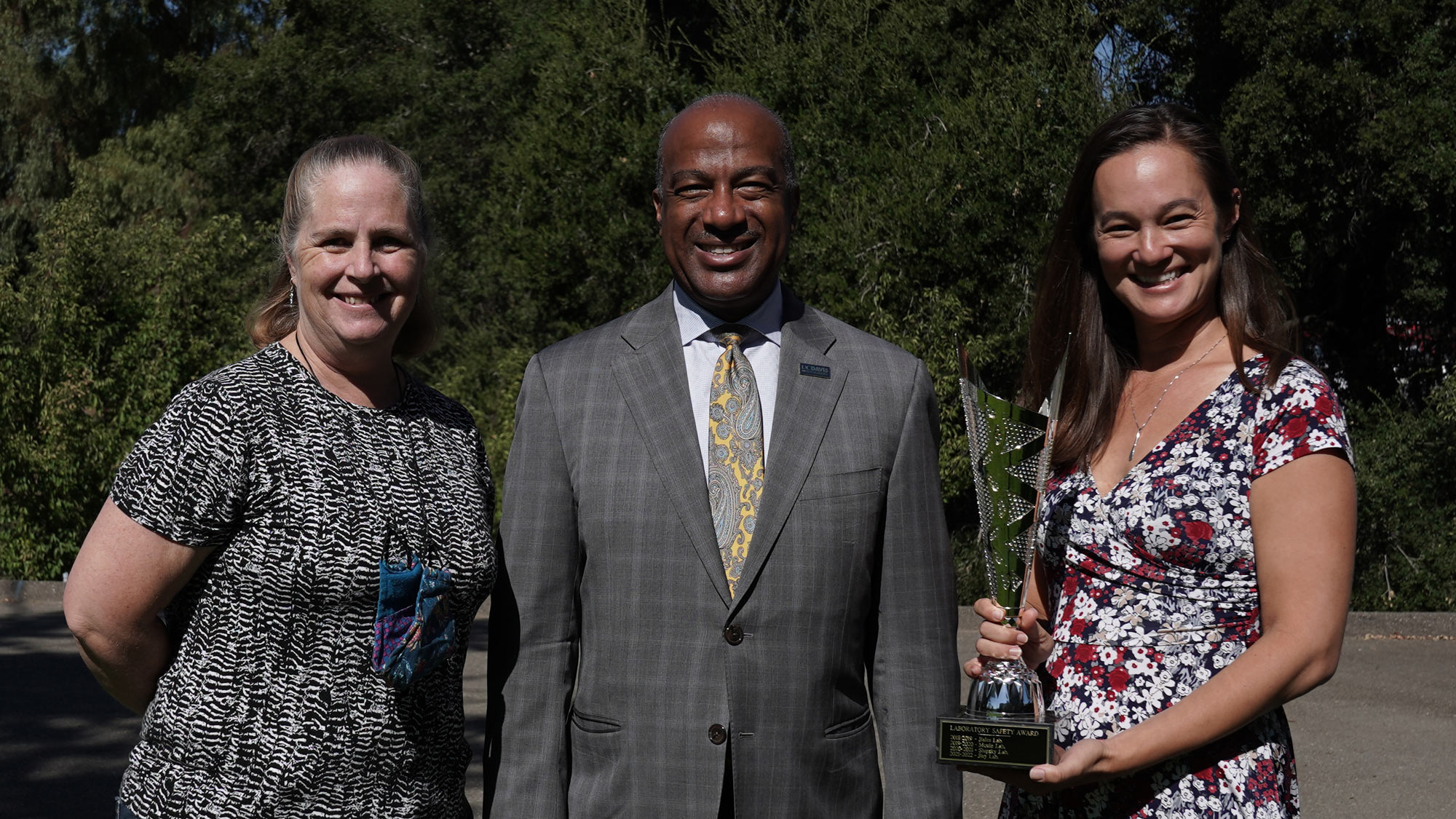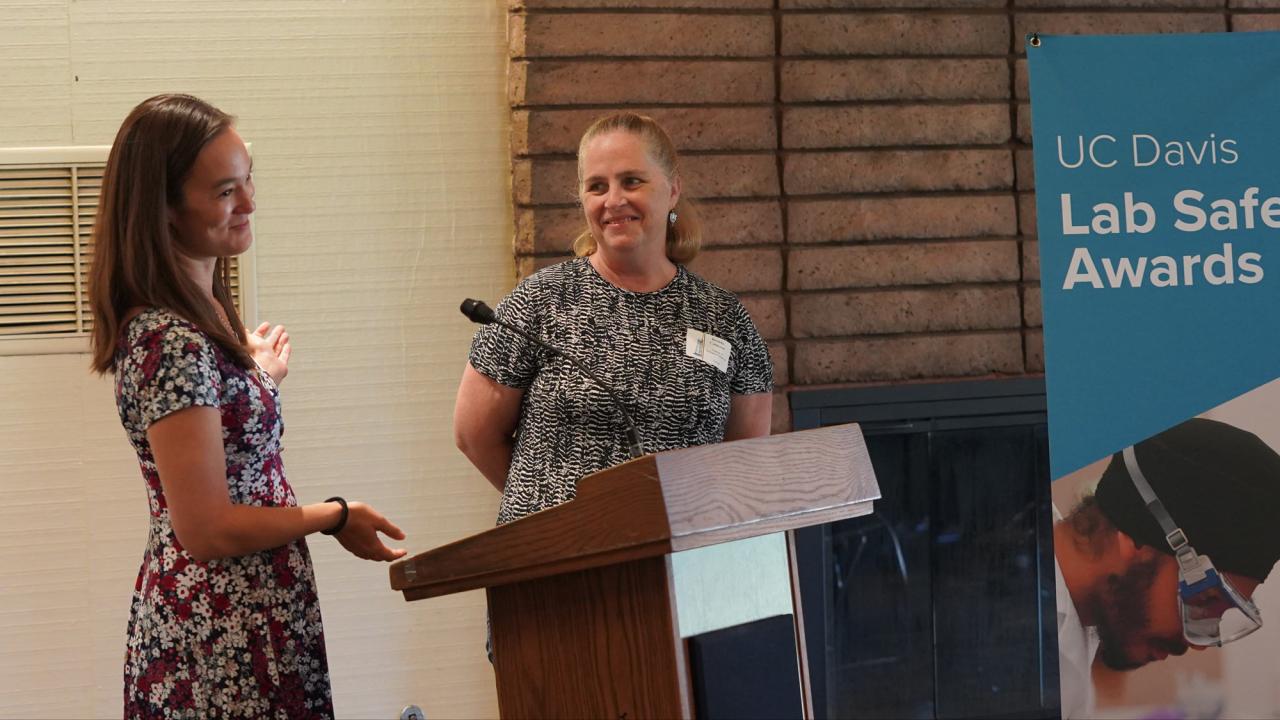When you’re experimenting with water, electricity and live animals, a lot can go wrong if you’re not careful. And no one knows more about that than Rachael Bay and her research team.
They study human induced changes in the environment and evolutionary processes — things like climate change, coral bleaching and bird migration. And when you’re doing that kind of work — handling chloroform one day and animal blood the next — you want to make sure you’re not cutting corners.
Which is why Bay, assistant professor in the Department of Evolution and Ecology, prioritizes training above all else in her lab. Such effort has been rewarded with top prize in this year’s Lab Safety Awards program: $6,000 for the lab to spend.
The Bay Lab in the College of Biological Sciences was among six finalists for the top prize — one from each college and school with lab operations. The other finalists for 2022, listed by principal investigator (each link will take you to a Safety Services webpage about the lab’s safety efforts):
- College of Agricultural and Environmental Sciences — Melotto Lab (Maeli Melotto, associate professor, Department of Plant Sciences
- College of Engineering — Fernandez-Bayo Lab (Jesus Dionisio Fernandez-Bayo, assistant professional researcher, Department of Biological and Agricultural Engineering
- College of Letters and Science — Krubitzer Lab (Leah Krubitzer, professor, Department of Psychology and Center for Neuroscience)
- School of Medicine — Burns Lab (Marie Burns, professor, departments of Ophthalmology and Vision Science, and Cell Biology and Human Anatomy
- School of Veterinary Medicine — Imai-Leonard Lab (Denise Imai-Leonard, health science associate clinical professor, Department of Pathology, Microbiology and Immunology).

The Bay Lab
Strict schedules ensure everyone is up to date on lab and fieldwork training, not only on the fundamentals but also the use of specialty chemicals and the administration of first aid.
The Bay Lab’s sheer number of rooms and research spaces can complicate safety efforts. Whether it’s in marine or tropical walk-in space, at the lab bench, a microscope or using the campus’s core research facilities, each new project starts with a safety review.
And, because lab bench space is tight, everyone must work together to clean up and keep their shared bench space tidy. By keeping clear documentation and committing to organization, the lab has managed to stay on the same page about what’s where and who’s who.
The lab also works in remote locations around the world, so research plans always include safety measures for fieldwork and the safe transport of samples and reagents.
Another factor: Graduate students whom the lab “adopts” from other departments when the students use the lab’s equipment for molecular work and DNA extractions. Coming from places like plant sciences a lot of them have not worked with harsh chemicals and all of a sudden are handling liquid nitrogen for the first time.
Brenda Cameron, lab manager, who has been working in the Department of Evolution and Ecology for the past 25 years, handles all the trainings for both new and seasoned researchers. She and Bay believe they owe their lab safety success to their “see something, say something” philosophy.
They have cultivated a lab culture that understands mistakes happen — and they learn from them rather than laying blame. This includes mistakes in lab protocols, administrative mistakes and even errors in safety. When issues arise, they are spoken about openly and treated as a learning opportunity, and even posted on a bulletin board to normalize transparency rather than shame.
On to 2023
Data collection begins anew every July 1 for the awards program. The faculty-led Chemical and Laboratory Safety Committee endorses the awards, and all labs in the comprehensive annual lab safety review program are eligible.
Tahlia Aghily is a writer in Finance, Operations and Administration.
Media Resources
Dateline Staff: Dave Jones, editor, 530-752-6556, dateline@ucdavis.edu; Cody Kitaura, News and Media Relations specialist, 530-752-1932, kitaura@ucdavis.edu.
